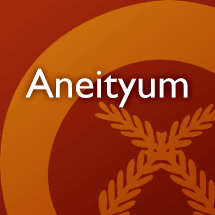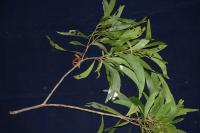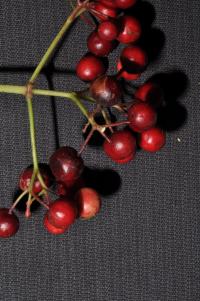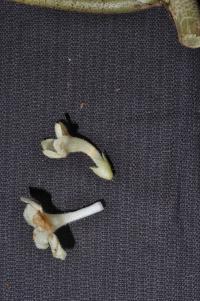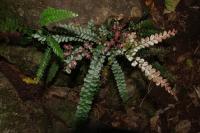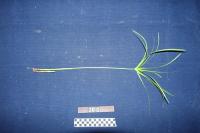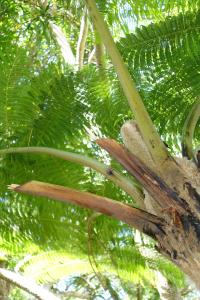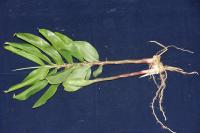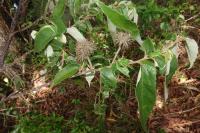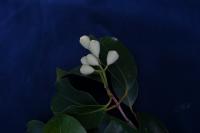Your search for * in plants has returned 100 entries
ijumgan nijomcan
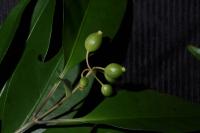
n. small tree, 1-2 m tall (collection: Gregory M. Plunkett #4020)
Example: 1. The name of this plant translates as bad tooth, and relates to its use as a plant used to poison others. If one wants to commit an evil act against another, he or she will rub the leaves together and squeeze them over the targets food. It will make their teeth rotten and fall off quickly. More information witheld.
bookmarkincat
n. flax
bookmarkinceimohos
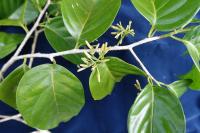
incejev ataheñ
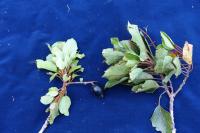
incetcanalaeñ
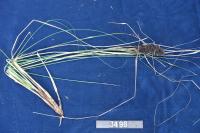
incetceianalañ
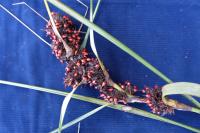
incipiñti
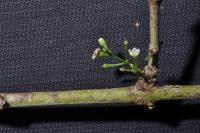
inciñpiñti
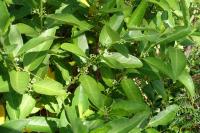
incuwukava
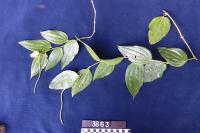
ingitjiñat
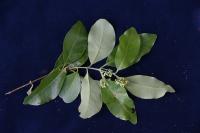
n. small tree, 2 m tall (collection: Gregory M. Plunkett #3528)
Example: 1. This plant is used as firewood, but also the heartwood is sold. 2. In 2016, the first grade wood was 2500 VT per kilo, the second grade wood was 2000 VT per kilo. 3. The ancestors used to take the oil or wood chips from this tree and bathe with it to keep away evil spirits of the forest. It is currently planted on Aneityum for commerce. Scrape bark of sandalwood into coconut oil in same wat as GMP 3513 (gardenia) boil and take out the bark. 4. The leaves can be fed to pigs to make them strong and heavy.
bookmarkinhamesei
n. the name of a native plant
bookmarkinhau amai
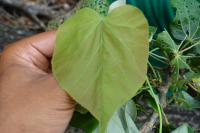
n. moderately branched treelet, 2 m tall (collection: Gregory M. Plunkett #3203)
Example: 1a. This type of hibiscus has young leaves that are reddish in color and it is an edible type. The stems are eaten during April-July. Harvest the stems, beat them and cut off the outer bark. Collect inner bark, slicing it off the stem and wrapping it in a banana type leaf with coconut milk added. Bake all night at least 8 hours, then it is eaten. Said to taste like a root vegetable. Used during the dry season when there are not many crops available. 1b. Take young shoot of the tree then pound the base to separate the base of the bark from the stem but leave it on the stem, say pound 4-5 inches around the base, then come back 3-4 months and the rest of the bark would be thicker. Then cut where it was pounded, cut stem in 1.5-foot pieces, bake on an earth oven, leaves on bottom layer (on top of charcoal) then sticks, then leaves on top, then hot stones, and then more leaves. Bake for 1.5 hours, then remove a stick at a time and use shell to scrape away outer bark, cut into 6 inch pieces, put on log, pound to make softer, put in lap lap leaves leaf wrapping, add coconut milk, put in stone oven, cook for one hour then open lap lap leaves and eat. 2. This variety is for this purpose just like Pohnpei. 3. This variety is not used for grass skirt.
bookmarkinhoam̃a
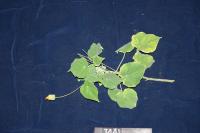
n. shrub, 1 m tall (collection: Gregory M. Plunkett #3441)
Example: Flowers put in hear as an ornament that has power because it is so beautiful. Leaves are burned and added to a bamboo pipe and mix with a foam that forms in fresh water, when people go to a traditional dance, men paint part of their face eyebrows and beard to attract attention, hence the name, pone part of which "am̃a" means "staring", because it will cause people to stare at the one wearing it.
bookmarkink
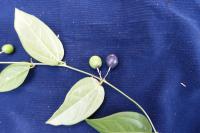
inlepei u inpoded
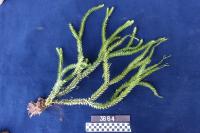
n. epiphyte, growing in secondary forest along trail above river. (collection: Gregory M. Plunkett #3664)
Example: This plant is used to make a head garland, but if you are going hunting or fishing do not put this on your head as you will not be successful in your quset. This is the grass skirt for the spirits; you can hear them but you cannot see them.
bookmarkinma
n. Artocarpus altilis
Example: shoot: Mix heated over fire and taken out during sunset. Healer clenches the package in his fist, then gently punches the patients left, then right knee, then his forehead and finally squeezes over his head, migraine and headache.
bookmarkinmahe
n. the pandanus leaf
bookmarkinmathethi
n. Tabernaemontana padacaqui
Example: leaf used for for wounds; cold maceration taken internally against "skin cancer" (severe wounds?). Stalk, chewed, influences sex of an embryo in favor of a girl.
bookmarkinmauwad
n. a convolvulus
bookmarkinmejei
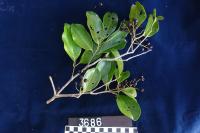
inmopoñ
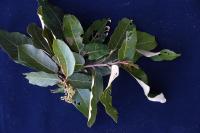
n. tree, 10 m tall (collection: Gregory M. Plunkett #3516)
Example: The young stems are used to make fishing spears. These stems are also used to make the poles that connect an outrigger to a traditional canoe, as they are light and strong. The large trees have extensive roots and stumps and are used as a pen for pigs by making a fence from these.
bookmarkinmowad
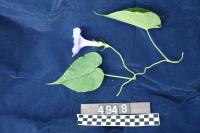
n. vine to 40 cm, flowers blue (collection: Michael J. Balick #4949)
Example: To heal cuts, select a piece of the larger part of the stem (woody) cut a 6 inch piece and blow on one end; the sap comes o ut on the other end and this can be used to cover the wound. As a pig feed, people collect the stems and leaves and feed these to the pigs.
bookmarkinmowad itouga
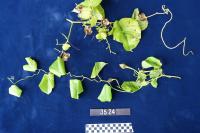
n. vine climbing on Geissois denhamii (GMP #3522), growing in open (collection: Gregory M. Plunkett #3524)
Example: The word itougo means from a different country or place outside of Aneityum. The plant was introduced by the first missionaries who came to Port Patrick. Calendar plant – sea cost people see this flower in the forest and they know it is time to go into garden and harvest taro or make new gardens– see GMP 3263. This is also good firewood.
bookmarkinmowad u pikad
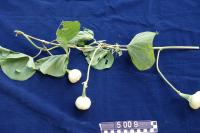
n. vine to 5 m tall in trees, fruits maturing yellow-brown. Growing in agroforest/secondary forest. (collection: Michael J. Balick #5009)
Example: People collect this vine and feed it to pigs. It also has an unspecified medicinal use. The vine of this plant forms a thick canopy so some people plant it around the house near trees that do not give much shade in order to reduce the intensity of the sun on the house and thus keep the temperature lower. The vine grows quickly into the trees.
bookmarkintejed
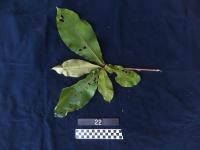
n. tree. Growing in village garden. (collection: Ashley A McGuigan #22)
Example: 1. Timber for houses, hard wood. 2. Fruits have a highly desirable nut that is edible when fresh after cracking the fruit. 3. Medicine – 5 young tips, boiled in 3 cups of water, and steam eyes when have conjunctivitis. 1x. 3. Calendar plant – When the leaves turn red and are ready to fall off from the tree – the lobsters are ready to be harvested – best time to harvest lobsters. Firm tasty meat. This was a traditional population management so that lobsters were not harvested year around but only during this season, Oct–Nov, for a month or 1.5 months.
bookmarkintesyanam̃a
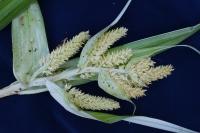
intijganeno
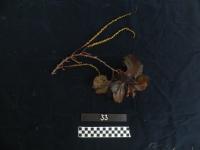
n. shrub. Found in the village Unames. (collection: Ashley A McGuigan #33)
Example: name = "stonefish ears" 1. To treat rashes - boil 4 leaves in water ad wait until it cools. Wash in this once a day until rash goes away. 2. Stonefish sting – very painful: 1 handful of leaves with squeezed coconut juice – coconut water – from green coconut. Mix the leaves and water and then make a cut in the wound to enlarge it and pour this juice into the wound. In 5-10 minutes the pain will stop, use 1x, very powerful. 3.If a person such as a mother touches the stonefish while preparing it for food, then does not wash hands, can infect a child – and the child will get sores. Take a small branch and boil it in the water and wash the baby with it to make pain go away. 4. Stonefish is a greatly appreciated food that must be prepared carefully by holding the fish by the mouth and not touching the body. Boil the fish to inactivate the poison and then prepare it as a normal fish for cooking. Poison is found in top spine of fish.
bookmarkintop pa
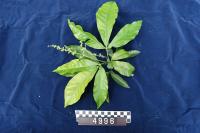
n. shrub to 2 m tall, dbh 2 cm (collection: Michael J. Balick #4996)
Example: This is an ornamental plant, grown around the home. People crush the leaves to enjoy the fragrance released. When bathing, grate coconut meat and crush the leaves of this plant and rub all over the body, before bathing and afterwards your body will smell very nice. To repel mosquitoes, crush these leaves and put them in the house.
bookmarkintopasyej
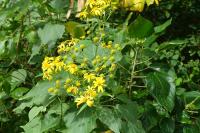
n. shrub to 2 m tall, flowers yellow. Growing along coast. (collection: Michael J. Balick #4959)
Example: The young leaves are boiled for 15 minutes and coconut milk is added to the warm leaves and this is eaten--the coconut milk it said to make the leaves taste better. New mothers are given this food as it helps them to produce more milk for their babies. As a medicine, take the young shoots, peel the outer skin off of these, macerate a 3’ piece of young stem in a small amount of water, take out the fiber, put the juice in a tablespoon and feed it to a baby that is old enough to swallow water (not a new born) when they have diarrhea. Take once daily for 2-3 days. This remedy is used for babies up to one year of age. For older babies that have diarrhea, peel the young 3’ stems and give them to the child to chew (spit out the fiber) and have them drink a small amount of water after chewing. This treatment is once daily, for 2-3 days until the diarrhea stops. For adults, take 4 young stems about 3’ long and chew these and swallow the juice, twice daily (morning and afternoon) and use until the diarrhea stops. When this plant is in flower, hunters know that the turtle has more fat and can be harvested--a calendar plant.
bookmarkintop̃ hau
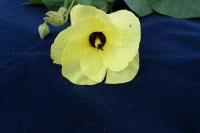
n. well branched tree, 6 m tall (collection: Gregory M. Plunkett #3202)
Example: 1. Young shoots are peeled and made into grass skirts. Scrape the stem and take the green part off, tie strips together and put under stones in the sea for retting, let sit 5 days in sea, but check these on a daily basis. When the fiber becomes soft, that is the time to take it from under the stones, clean off the excess materials, and hang it in the sun to dry for 3 days--this will bleach it and give it a whitish color, at which point it can be woven into a skirt. 2. The fiber can be used to make a small rope that is tied with shells and used for custom dances. 3. When the stems of this tree are older, the wood is very hard and it can be used to make the main frame that is arched for a cyclone house. According to Reuben these houses are not made much anymore on Aneityum Island. 4. To cook the intestines of fish that are eaten, take several leaves and put them in a small pile, making a wrapping, then use a local fiber to tie this together and cook on charcoal for as long as needed to prepare the fish parts. 5. In this area, sometimes knowledge of the plants and flowering are used as a calendar to indicate the time for planting of specific crops. Reuben will provide more details on a future trip. 6a. This species is an important "message plant." If a person is not home and you are visiting from the East--e.g. an Eastern part of the Island--that person can leave a 12 inch piece of stick in front of the door of the house so that the inhabitant knows that an eastern visitor (from Anawonjei district) has come by your home. The reason that person has come to visit is to pass an important message to you--good or bad "luck". The bad luck message might be a death, and is not told directly to the person. The good luck message might be a birth, or conflict that has been resolved. These messages are communicated using sticks--each district has a different species of plant. Reuben’s is the hibiscus. 6b. Message plant for Eastern people. If someone dies, use this plant, clip it in front of hem, in front of home, they ask “who” and you can tell them. In Eastern culture you cannot tell them directly. 7. When a person is too drunk with kava, take a branch of this and brush him with it to help make the effects go away. 8. Traditional plates for food.
bookmarkintop̃asiej ura
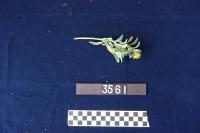
n. stoloniferous herb, 15 cm tall (collection: Gregory M. Plunkett #3561)
Example: In the past the ancestors learned to cook the leaves of this species with fish in an earth over and then eat the leaves as well as the fish. Today, fish are wrapped with small leaves and then covered with lap-lap leaf (Polyscias) and cooked in an earth oven.
bookmarkintowosjei
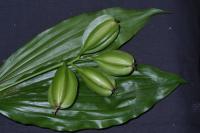
inyetupou lelcei
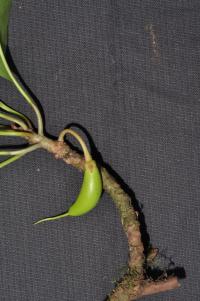
inyiivac
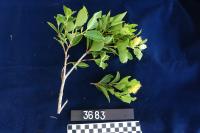
inyiriñwei
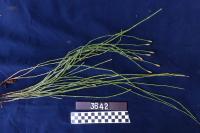
n. herb, growing along the river at the edge of secondary forest. Stems pale green. (collection: Gregory M. Plunkett #3642)
Example: As a local toothbrush, take two pieces of stems, bend them and use to brush teeth with water. This plant acts like sandpaper to clean the teeth. Can also be used to brush pots.
bookmarknaha
n. Crinum asiaticum; variation asiaticum L.
Example: from leaves taken internally as a laxative to treat ciguatera and against asthma
bookmarknahod
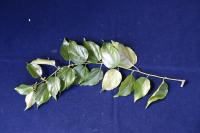
naipumnyu
n. kind of plant, grass, or fern
bookmarknala
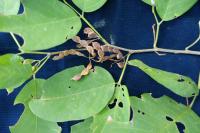
n. tree to 7 m, dbh 20 cm (collection: Michael J. Balick #4860)
Example: This is a common tree. If a person travels from one district to another on Aneityum, and you see the tree planted in that other district, a person knows they are free to come into this area. When the leaves are yellow, as in a young tree, the local name is nala’gay. If a person carries a branch of this tree into a village it is a symbol that the person is coming with peaceful intentions.
bookmarknamou
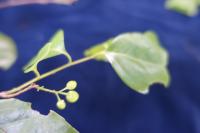
nanad
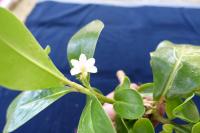
nanad itohou
![1. The leaves of this plant are used as a fertilizer when a person plants taro "to help to feed the ground for next year." 2. Sapwood of this tree, and one more [GMP 3591], in old days take from west side and cross mountain to the east, and on red clay mountain, burn it to make spirits to give more sun instead of rain so that gardens will grow well.](/media/aneityum/pix/GMP_3456_MJB_43-scaled.jpg)
n. shrub, 2 m tall (collection: Gregory M. Plunkett #3456)
Example: 1. The leaves of this plant are used as a fertilizer when a person plants taro "to help to feed the ground for next year." 2. Sapwood of this tree, and one more [GMP 3591], in old days take from west side and cross mountain to the east, and on red clay mountain, burn it to make spirits to give more sun instead of rain so that gardens will grow well.
bookmarknanini
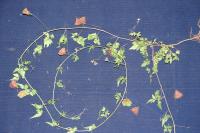
napapotan
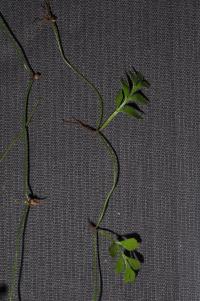
nap̃at
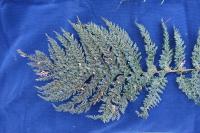
n. terrestrial fern, growing in dwarf cloud-forest. (collection: Gregory M. Plunkett #3268)
Example: For performing a weather magic ritual to produce fog, this plant is fermented along with another plant (nirid u numu) in a hole in a sacred stone (called "Naemoso") at a secret location on Aneityum.
bookmarknarijo
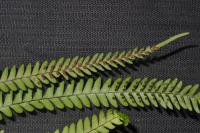
n. epiphytic fern on decaying log, growing in dense rainforest. (collection: Gregory M. Plunkett #4088)
Example: 1. Considered the same as Narijo. When it grow in good soil it takes the form of GMP 4087. In cold and rocky soil it this form.
bookmarknariko
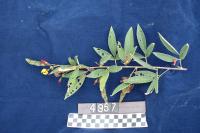
n. shrub to 3 m, flowers yellow with red outer coverings (appearing red when closed) (collection: Michael J. Balick #4957)
Example: This plant is used to fertilize fields, especially by growing it in fields that have been used for other crops for a very long time. The seeds can be cooked when dry and hard, boiled in water, or eaten directly without preparation when green and soft.
bookmarknategpece
n. kind of plant, grass, or fern
bookmarknatuh
n. a sweet-smelling plant
bookmarknau
n a plant, with upright clumping. (collection: Ashley A McGuigan #25)
Example: 1. To cure the sea snake (nispev) curse that causes missed periods. First the husband must combine 4 young leaves of incispev and 4young leaves of nafanu and mash and squueze the juice into a small bamboo (1-1.5 inch diameter) The nafanu is important because it is a plant that connects to the sea. Use wildcane leaves cover the bamboo closed. Go to the sick person and unwrap the snake from her. Start from the top and let the woman drink a small part of the potion then wash her with the mixture, making sure to wash head, elbows, knees, feet, and belly. Then take a leaf of naha and break it over
bookmarknaurakiti
n. kind of plant, grass, or fern
bookmarkneau
n. a small water-plant
bookmarknednaeñ
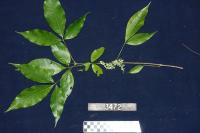
nedwodou
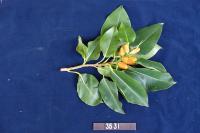
n. tree, 10 m tall (collection: Gregory M. Plunkett #3531)
Example: 1. For a child around 1 year of age, take the inside bark, mash it, boil in hot warter and then use it to wash the child. This will ensure that the child will grow strong and make them able to crawl fast. 2. If a woman who is one month pregnant would like to have a baby, she is given 4 of the tips of the branches to chew and swallow everything before breakfast 1x only. 3. For fishing, take 4 leaves, hold top side up, tear right half of leaves off, keep left side, roll it up and put with fishing gear to have good luck when fishing in the deep sea beyond the reef.
bookmarknegrecreipek
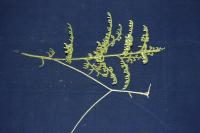
nehivaing
nejeg tau
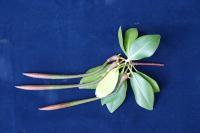
nejev
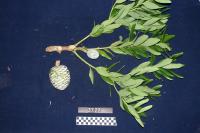
nejev
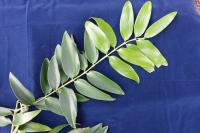
n. tree, 8 m tall (collection: Gregory M. Plunkett #3214)
Example: This tree makes good wood for canoes as well as timbers that are cut for building houses. A decoration that is placed around the head, known as salu-salu is made from these leaves. If you wear it, people know you are from Aneityum. In the early 1950’s-1960’s, Aneityum was the main place for logging this species. Now it is rare and in need of replanting. A project from New Zealand planted pine trees in its place and they have thrived here. In the same way, the sandalwood tree was overharvested and is rare now. Timber, very resinous so good to start fire – branches good for fire. They are the ones that have the sap, if a person in in the bush and finds young tree – sapling – they will make headdress from the leaves to show they came from the bush. Also, this is a Kastom name.
bookmarknelkasau
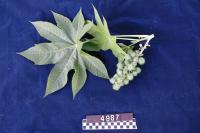
n. shrub to 4 m, fruits green (collection: Michael J. Balick #4987)
Example: This leaf is used as the upper layer of leaves on the earth oven. If the leaves of #4986 are in short supply, people cover the first layer of stones in the earth oven with these. The stems of this plant are used as tinder to light fires. The seeds are poisonous.
bookmarknelmaha
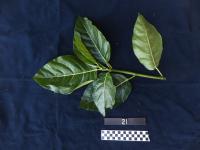
n. tree. Growing near village. (collection: Ashley A McGuigan #21)
Example: 1. To cure spirit sickness of the niteitau. Use plants that also end with "au" : niditau, intoutau, naoyerop. Go to the top of the plant to get the soft leaves of the plants niditau, intoutau, naoyerop, also take the bark. The person making the medicine should be holding the these leaves with a piece of nelmaha. Nelmaha means go away. The sick person chews the leaves and bark and swallows the juice spitting out the fiber into the nelmaha the medicine maker is holding. The medicine person then takes the spit out fiber in the nalmaha leaf and throws it into the sea in front of the village. 2. To cure headaches casued by bad spirit - Take one top from Nelmaha and one from inrowod (white stripe variety) Combine and chew these then spit them out and apply to the sick persons forehead. 3. To cure headaches - Someone other than the woman must prepare this. Break the top branch of netethae and remove leaves for use. Combine with the top leaves of the top branch of nelmaha. Chew the leaves and drink the juice. Do this when the sun is setting on the horizon. The woman gives the leftover fibers to the person who prepared the medicine and that person goes and throws the fibers in the direction of the setting sun. 4. To cure toothache when pregnant - Take the inner bark from Intejed and boil it in a pot of seawater (about 1 liter) along with 2 leaves from each of inpounatmas, narayag, nahayag, and nelmaha. Boil until juice is visibly leaving the plants. Put this water into your mouth and hold it there for 2-3 minutes. Do this this with one cup in the morning, 1 cup in the afternoon, and 1 cup in the evening. 5. Used to fight against black magic in an unspecified way. 6. Roll leaf and put in pocket for protection when walk in a new area. 7. Message plant if a land dispute – if a person puts this stem or leaf in another’s garden whom they are angry with it means go away!! 8. To treat sick people, especially who fall ill from black magic to save their life. Symptoms vary, for example a person with small boils over body,* a person chews the leaf and spits it on the sick person, 1x and then puts the branch with leaves near the sick person when they sleep – 3x (1x day) branch is ca. 25cm long. (*headache, severe)
bookmarknemtanla
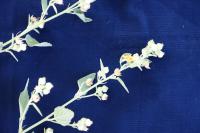
n. herb to 1 m, flowers yellow. (collection: Michael J. Balick #4892)
Example: If a person is coming to a "new" village, e.g. not their own, and they have a branch in their hand, it means that they are coming in peace and not trying to harm anyone else in the new village. Or if they are asking for something that might be found in the new village, they hold the branch of this species and pass it to a person from that village so they will accept you.
bookmarknemtokei
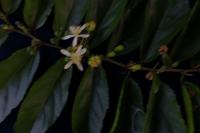
n. tree to 7 m tall, dbh 8 cm (collection: Michael J. Balick #4861)
Example: When a person does heavy work and their body feels tired, they should take 1 handful of leaves, squeeze them into a cup of water and drink--this will make the person feel better. People can drink this from time to time to give the body energy even before you are tired. To treat constipation, take 4- 8’ pieces of stem from a 2 cm dbh section of the tree, peel the outside bark off, collect the inner bark and mash with a stone or hammer, put in a colander to strain out the wood, add 1.5 l water, the liquid becomes green or whitish with sticky liquid. Drink this one time, it tastes cold and then after about 30 minutes it feels like the bowel is working and then normal function returns--this does not induce diarrhea but rather returns the bowel to normal function.
bookmarknese
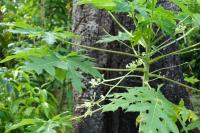
n. shrub to 2 m, flowers white. forest near house. (collection: Michael J. Balick #4871)
Example: A handful of flower buds are collected and put into water with 1-2 pieces of papaya roots. Heat the water and drink it hot for the treatment of hypertension or vein problems, or to promote circulation in overweight people. Do this treatment 1x a month. The white sap is collected and used to soften octopus flesh for eating. Put sap, fruits and chopped leaves in a bowl and add the octopus, allowing it to remain in the bowl for 1 hour--this will soften the flesh of the animal. The sap can be used to wash the skin of tough beef or wild pig--it helps to "burn" off (remove) the skin. When cooking tough meat, take young fruits of this tree and cut them up and put them in the pot with the meat, boil it to soften the meat which can then be cooked.
bookmarknese uinman
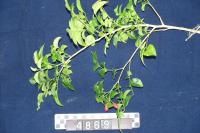
n. tree to 3 m tall, 20 cm dbh (collection: Michael J. Balick #4869)
Example: To treat toothaches, take a handful of leaves, boil them in 1 cup of water, take the warm liquid and leaves and wash or rinse the affected area as needed until pain resolves. The wood is used for carving and is yellowish in color. The stems are used to secure the outrigger to a traditional canoe.
bookmarknetemu
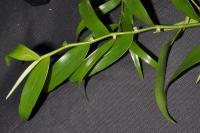
neteukin
n. the name of a poisonous plant
bookmarknetopdecraiñ
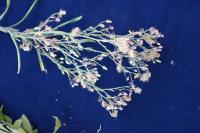
n. herb to 45 cm, seeds brown. Red clay soil (collection: Michael J. Balick #4888)
Example: The name of this plant means "division" -- if someone wants to help to destroy your business or home, they put this plant in front of your business or your home and this will help to scatter out your family from where they are living.
bookmarknida
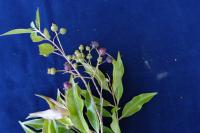
nigie
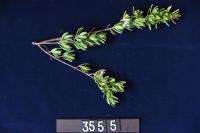
n. shrub, 1-2 m tall (collection: Gregory M. Plunkett #3555)
Example: This plant is an aphrodisiac. Eat with coconut meat to make the body strong. Take 1/2 handful of leaves and mix with coconut leaves, use as needed. Mostly men eat this combination. It is best to eat with dry coconut that has no water in it. Eat it any time you wish.
bookmarknijwou
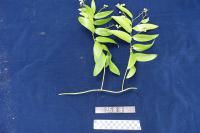
n. vine climbing up a macaranga tree, growing in open disturbed area. Fruits green. (collection: Gregory M. Plunkett #3588)
Example: 1. To build a cyclone house, take the vine of this species to tie pieces of the house. To prepare the vine for use as rope, collect many feet of it, put it in a fire, roll it in a figure 8, wait until it softens and then use for tying. This vine is hard and needs to be heated to a high temperature in the fire to make it soft; the person preparing this must use gloves to tie it to the posts and rafters while it is still warm. When it cools, it is very strong. Rope made from this vine will last a long time--perhaps 10-15 years. It can also be used to make a regular house. However, it is not as strong as GMP #3589. 2. For men who want rasta in hair, take a few leaves and dry them, burn with some other plants to rub on the rasta and keeps it healthy, keep from splitting.
bookmarkniperap
n. kind of plant, grass, or fern
bookmarknirid unmu
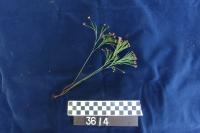
n. terrestrial fern, growing in primary rainforest. (collection: Gregory M. Plunkett #3614)
Example: People who go fishing take this plant along with other unspecified leaves, crush them and rub them on the fishing line that the person is using. This is said to attract more fish to the bait. It is also a "message plant" to be put in a person’s hat when they come back from fishing and then people know that they caught fish. Local name means "fish gill."
bookmarknithidao
nititidei
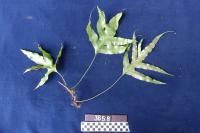
nomotmot ijis
n. kind of plant, grass, or fern
bookmarknop̃oe
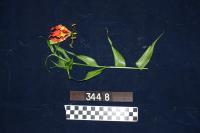
nuei
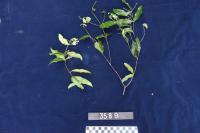
n. vine, growing in open disturbed area. Flowers white. (collection: Gregory M. Plunkett #3589)
Example: To build a cyclone house, take the vine of this species to tie pieces of the house. To prepare the vine for use as rope, collect many feet of it, put it in a fire, roll it in a figure 8, wait until it softens and then use for tying. This vine is hard and needs to be heated to a high temperature in the fire to make it soft; the person preparing this must use gloves to tie it to the posts and rafters while it is still warm. When it cools, it is very strong. Rope made from this vine will last a long time--perhaps 10-15 years. It can also be used to make a regular house.
bookmarknuhujcei
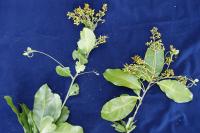
n. liana, climbing on Garcinia tree (collection: Gregory M. Plunkett #3585)
Example: 1. When the stems of this plant are older, and it is a vine, is used to tie thatch on roof rafters as it bends well. 2. Burned leaves and rubbed on fishing line and spear to increase catch – used with other unspecified leaves, that are forageable. When you are fishing and if you set a basket or mat it means danger and you have to return to shore – the spirit is telling you that it is enough fishing.
bookmarknumnyac
n. a kind of bulbous root
bookmarknässa
pudvel
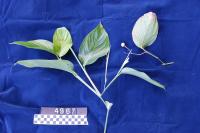
wakas
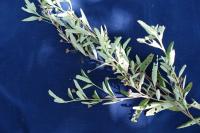
n. herb to 0. 75 m, flowers yellow. (collection: Michael J. Balick #4891)
Example: If a person has the flu, collect the fruits and chew and swallow them. Chew 3 fruits in the morning for 3 days. Take a handful of leaves, still on branches, and boil them in a half liter of water, for 15 minutes. Drink 1 cup daily for 5 days or until the sickness "goes down."
bookmark